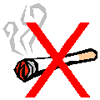No Butts! Passive Smoking
Passive smoking is basically breathing-in other people’s smoke.
It is also called involuntary smoking or second-hand smoking. The non-smoker breathes in second-hand (or environmental tobacco smoke) which includes sidestream smoke (i.e the one corner burning end of the cigarette) and mainstream smoke (i.e smoke exhaled by the smoker). Second hand smoke is the main cause of indoor air pollution and people are usually exposed at home, in workplace and public places such as restaurants and bars.
The immediate health effects of second-hand smoke include:
- Eye Irritation, Headache, Nasal discomfort and sneezing, Cough and sore throat, Nausea and dizziness, Increased heart rate and blood pressure.
- A non-smoker working in a smoke filled room for 8 hours will breathe as many cancer-causing chemicals as if he or she had smoked 36 cigarettes.
SECOND-HAND SMOKE IS ESPECIALLY HARMFUL TO CHILDREN 
Children who breathe second-hand smoke are more likely to get colds, allergies, middle ear infections, and “glue ear”, which is the most common cause of deafness in children.
Exposure to second-hand smoke and smoking while pregnant are both linked to miscarriage, low birth weight and stillborn births. There is also evidence that postnatal exposure of infants to second-hand smoke contributes to the risk of sudden infant death syndrome (SIDS)
What can be done about second-hand smoke?
- Strive to make your home, workplace and community smoke-free.
- Support the new Tobacco Legislation which protects non-smokers from the dangers of passive smoking.
- If your workplace does not yet comply with the new law, help develop a smoke-free policy at work.
- Ask smokers not to smoke around you
- Don’t allow smokers to smoke around your children
- Ask visitors not to smoke in your home
- If you live with smokers, set up a place outside where they can smoke or help them quit.
- If you smoke, avoid smoking in enclosed areas such as homes, offices, taxis, trains where others may be exposed to second-hand smoke.
OTHER TIPS
- Keep a fresh taste in your mouth by brushing your teeth frequently and using mouthwash, or a fresh breath spray
- Do stretching exercises
- Get plenty of rest
- Give yourself time for activities that are really important to you
- Take deep breaths as a distraction technique to relax
THE CAPE TOWN NO-TOBACCO FORUM TASK GROUP consists of
| Department of Health (Western Cape) | 021 483 2677 |
| Cancer Assocociation | 021 689 5347 |
| Heart Foundation | 021 447 4222 |
| City Health Smoke Complaints Line | 021 400 4291 |
| City Health Directorate | 021 400 4290 |
| Smokenders | 021 788 9120 |
| Health Promotion | 021 918 1708 (Editor) |
 |
DEPARTMENTE VAN GESONDHEID DEPARTMENT OF HEALTH ISEBE LEZEMPILO |
 |
- No Butts! Smoking and Pregnancy
- No Butts! Health Professionals and Tobacco Control
- No Butts! Passive Smoking


